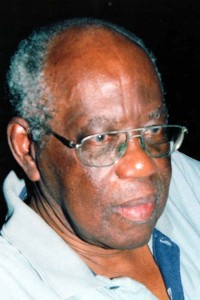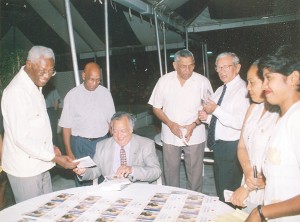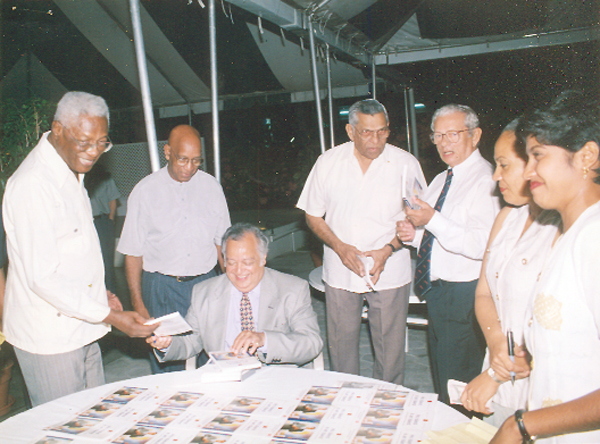By Rashleigh E. Jackson
Former Foreign Minister of Guyana
The achievements of Sir Shridath Ramphal are legion; and he is widely respected for his enormous contribution to the promotion of understanding and agreement, regionally and internationally. His is a formidable and well-deserved reputation.

My first experience of Sir Shridath at work was when he served as Attorney General. I was at that time an officer in the fledgling Department of External Affairs then under the supervision of Minister without Portfolio, the Hon Deroop Maraj. I accompanied the Minister when he sought the Attorney General’s advice on Venezuela’s claim to Essequibo and the prospect of Guyana’s admission to the Organization of American States (OAS). Sir Shridath’s pronouncements were incisive and were expressed with absolute clarity, features which I subsequently recognized as part of a slew of Ramphalian trademarks.
Those who were privileged to hear Sir Shridath’s presentation at the national consultation on the EPA had a taste of vintage Ramphal – scholarship and erudition. To my mind an outstanding feature of that presentation was his proposal of a solution which catered for the protection of Guyana’s interests, the preservation of the integrity of Caricom integration, and the maintenance of ACP solidarity.
It was however when Sir Shridath was Minister of State for External Affairs (1968 to 1972) and Minister of Foreign Affairs (1972 to 1975) that I was exposed more fully to the extensive range of his talents and skills, his use of persuasion as a tool for influencing opinion, his capacity for building consensus, his engaging personality and his ethical and philosophical moorings.

For much of that period (1968 to 1973) I served as his Permanent Secretary. In that capacity I worked closely with Sir Shridath and benefited from his counsel and guidance and was able to witness his management style. Sir Shridath set high standards for himself and encouraged staff to follow suit. The bar was always set at excellence. He saw clearly the value of high staff morale and instilled in those who worked with him an admirable work ethic and a sense of pride in participating in the formulation and implementation of the foreign policy of a small state imprinting its identity on the international stage. It is not surprising therefore that Sir Shridath placed emphasis on competence and professionalism.
There are leaders who are uncomfortable with or resentful of advisors or members of staff who possess high intellectual capability. Sir Shridath was not such a leader. On the contrary being intellectually curious himself, he welcomed work colleagues who were intellectually agile and encouraged constructive debates recognizing that they were helpful to him in arriving at finely honed positions on the policies or issues under discussion.
As regards the substance of foreign policy, it was on Sir Shridath’s watch, under the shrewd superintendence of Forbes Burnham, that the foundations of a coherent frontiers policy were laid. As a result, friendly relations were developed with Brazil, with which Guyana has the longest border. Problems with Suriname were sought to be resolved through dialogue, negotiation and other means of pacific settlement of disputes. The situation with Venezuela however provided many difficulties. Sir Shridath managed Guyana’s relations with Venezuela astutely. I have in mind here two notable accomplishments.
The first was the conclusion of the Protocol of Spain and the gentleman’s agreement he reached with Venezuelan Foreign Minister Calvani. The second was the advocacy of Sir Shridath which led to a change in the Articles of Association of the Inter-Development Bank to enable Guyana to become a borrowing member despite Vene-zuela’s claim to its territory. Other foreign policy successes include the launching of the Caribbean integration project, Guyana’s primary role in ending the regional isolation of Cuba, and Guyana’s high profile and influence in the Non-Aligned Movement and the Group of 77.
On the wider international canvas, Sir Shridath’s advocacy on behalf of Guyana embraced other great issues affecting the human condition – preventative diplomacy in the cause of international peace and security, and the establishment of an international system which is rule based and democratic, and which facilitates and promotes fair and equitable economic development.
When Sir Shridath made known his interest in serving as Secretary General of the Commonwealth, I was Guyana’s Permanent Representative to the United Nations and President of the UN Council for Namibia. It was in the latter capacity that I travelled to Mogadishu, Somalia, to represent the council at a meeting of the Organization of African Unity. There I solicited the support of Commonwealth African countries for Sir Shridath’s candidature. In the result, the combined efforts of the overall campaign team achieved success.
As is known Sir Shridath was elected as Secretary General, a post which he held for fifteen years and in which he served with distinction. He energized the organization. Under his stewardship the Commonwealth, which was looked upon in some quarters as a kind of quaint collection of ex-colonies shepherded by the ‘mother country’ and engaging in polite conversation, was transformed into a dynamic grouping providing solidarity for and mutual assistance among, its members and, as a collectivity, making pronouncements on, and proposing solutions to, many of the serious problems confronting the international community, issues such as international economic relations, the vulnerability of small states, climate change, and freedom of South Africa. As regards the last issue Common-wealth Heads of Government had appointed a Committee of Foreign Ministers, of which Guyana was a member, to provide high level impetus and guidance in furtherance of the objectives of a statement they adopted at their meeting in 1987.
The committee’s meeting in Abuja, Nigeria in 1990 which Nelson Mandela attended was the last at which Sir Shridath was present. The meeting ended with farewells to the Secretary General.
In my intervention I recalled that in 1975 I had written Sir Shridath congratulating him on his appointment, but expressed my view that he was not doing the right thing in going to the Commonwealth. I went on to say in Abuja that time had proved me wrong. In recounting that scenario later that year in a speech in London, Sir Shridath opined “That, for me, was eulogy enough.”
I have often wondered how different the course of history could have been if the United Nations had the good sense to have followed the example of the Commonwealth and elected Sir Shridath as its Secretary General when it had the chance to do so. Unfortunately the United Nations continues to be governed by some arcane principles imposed by the victors of the so-called Second World War in the twentieth century. Thus there is the absurd situation whereby powerful countries which play the role of high priests in preaching the gospel of democracy, resolutely resist having its norms apply to the United Nations. The world body and humankind continue to be adversely affected by such anachronisms.

